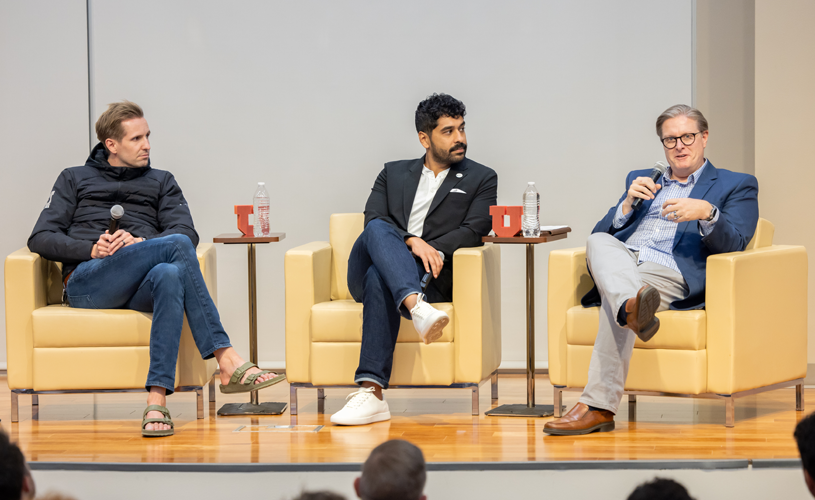at the University of Utah
Insights from the Eccles Alumni Forum: Utah’s Expanding Venture Capital and Private Equity Landscape
Salt Lake City may not be the first place that comes to mind for a thriving venture capital and private equity ecosystem. But, as was discussed in a David Eccles Alumni Network Forum, venture capital and private equity play a critical role in Utah’s business ascent – and even more growth and activity is ahead.
Panelists for the event were Smit Naik, Senior Director of Sorenson Impact Investing at the Sorenson Impact Institute, and Aaron Murdock, Managing Partner at Mayer Brown. The Conversation was moderated by Jack Boren, Managing Partner at Epic Ventures and a member of the David Eccles Alumni Network Board.
The discussion started with some definitions of venture capital and private equity. Venture capital helps companies in the early stage and usually involves an investor or venture capital firm acquiring a minority stake in the company, Murdock said. Private equity, on the other hand, usually involves firms buying private companies outright and then taking them public. Though, Murdock added, companies are spending longer and longer in the venture capital stage, taking advantage and longer-term support for greater liquidity.
Impact investing adds another layer to this ecosystem, Naik said, by asking the question: how is the world made better or different because this company exists? Naik said he disagrees with the idea that to do good, you have to make less money. Instead, impact investors are looking for what Naik refers to as the “double bottom line.”
Lawyers, like those at Mayer Brown, help new companies structure their relationship with investors, striking a balance between control and collaboration. In an ideal investor-company relationship, the two parties work together collaboratively, Murdock said. Investors can be a great source of insight and experience that can help new companies thrive, he said. Because of that, the people you are partnering with really matter.
As for the venture capital and private equity landscape in Utah in particular, Murdock referred to it as a “land of opportunity.” Active since the early 2000s, there is still plenty of room for growth in the space, he said, and people are doubling down on investing in the Utah landscape. The trick, Murdock said, is to make sure the critical pieces currently supporting a healthy investment landscape stay in place even as the ecosystem grows.
Some of those pieces – affordable housing, accessible education opportunities, and a high quality of life – are outside the work of investors and founders, but directly impact whether people want to live in and invest in Utah.
Naik, who has only been in Utah and in his role for a few months, said he was drawn here by the unique combination of universities, communities, and talent retention that exists in Utah.
“It feels like I’m on a rocket ship here,” he said.
When asked about what industries were growing the fastest, Naik responded that SaaS (software as a service) was particularly strong in Utah, while Murdock pointed to the life sciences and the number of life science technologies that have been launched into businesses from the University of Utah.
Both panelists also agreed that Utah is making a play to be in the AI space, but what exactly that will look like is still a bit up in the air.
As for tips for founders looking to leverage venture capital and private equity, Murdock cautioned them not to rush through the due diligence process, and not to underestimate the importance of teamwork and working with investors as collaborative partners. Naik’s advice was not to underestimate how much time it takes to raise the money to get a company off the ground. He also advised founders to get a lawyer early in the process.
Perhaps the most burning question for the panel was whether Utah can play in the same league as venture capital hotbeds like the Bay Area. Both Murdock and Naik agreed emphatically that the answer is yes.
“Everything that anywhere else can provide you is right here on this campus,” Naik said. “Utah can do it as well.”





